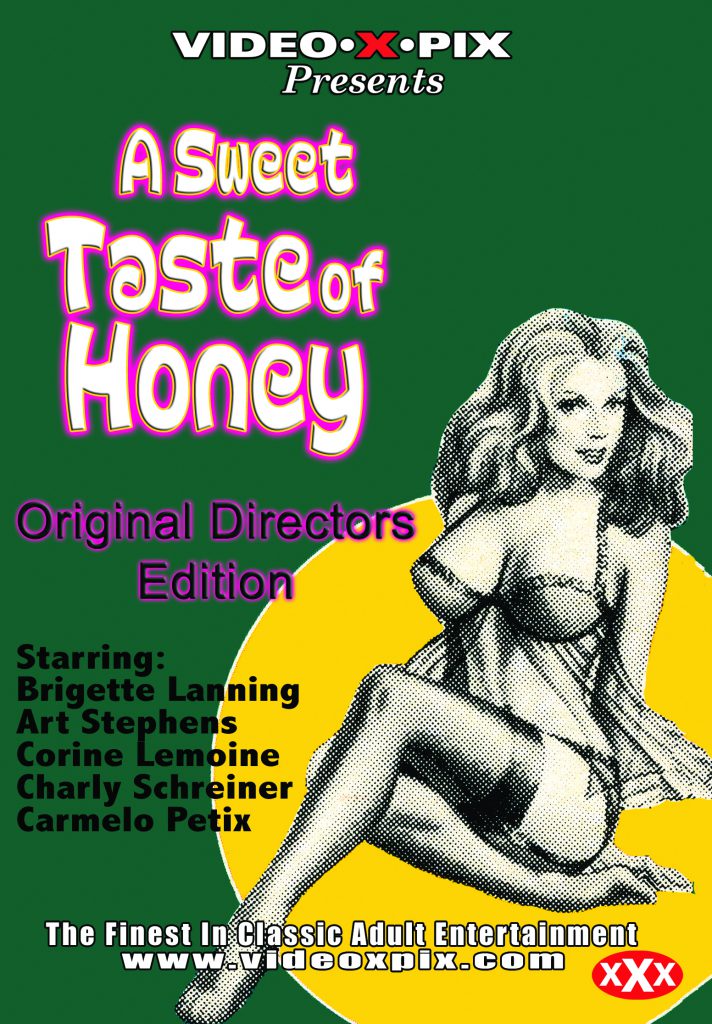Reviews
A Sweet Taste of Honey (1976)
A Sweet Taste of Honey (1976)
A key figure in the evolution of French erotic cinema, the late Max Pécas has unflinchingly unveiled the curves of Continental cuties like frisky Fraülein Elke Sommer (in both Daniella by Night and Sweet Ecstasy) since the dawn of the ’60s. It’s a measure of the local adult industry’s fleeting flirtation with respectability, brought on by a burst of box office success, that established filmmakers such as him and Serge Korber (a/k/a “John Thomas”, perpetrator of the publicly incinerated L’Essayeuse/Love Play, an act of censorship that forced the fuck flick revolution to its knees) agreed to dabble in dirty movies out of artistic aspiration – and commercial consideration, obviously – rather than economic necessity, as would be the case for many a lesser luminary in years to come. Of course, the death knell’s ominous toll as the government ghettoized the genre through rigorously applied taxes upon taxes just as quickly sent them scurrying back to the comforting confines of the mainstream. For Pécas, this meant a string of dispiritingly dire fashionable farces fortunately withheld from crossing the country’s borders, a queasy quagmire of forgettable fare only disrupted by the mean-spirited crime drama Brigade of Death, offering a redemptive cameo to reformed rumpy pumpy royalty Brigitte Lahaie.
Embracing the explicit for all of two films, Max followed his well-received if conventionally constructed Félicia – the sort of cautionary tale of the innocent interloper upsetting the wedded bliss of its protagonists that was Joe Sarno’s bread and butter – with the considerably more creative Luxure, retitled A Sweet Taste of Honey for stateside release. An adult spin on Alain Resnais’s arthouse folly Last Year at Marienbad, rightfully dreaded by any fledgling film school attendee, the movie liberally borrows yet tellingly gender-reverses the central conceit of a man trying to convince a woman that they have already met at the same swanky titular spa the year before along with some of its surreal trappings. Resnais’s snoozefest made a critic’s darling out of regally refined Delphine Seyrig, an image the actress herself cheerfully shattered by slumming it in Harry Kümel’s fullblooded vampire sexploiter Daughters of Darkness. A similar though mirrored fate befell her carnal counterpart, the stunning Karine Gambier, whose increasingly dramatic physical appearance with severely plucked eyebrows and hair that went from a pleasing platinum to an otherworldly white relegated her to the portrayal of one note archetypes like the disquieting domestic in Francis Leroi’s Je Suis à Prendre a/k/a Take Me or the monstrous prison warden in Erwin C. Dietrich’s Island Women. Clearly, Pécas saw something in her that subsequent mentors missed as she has never been more subtle or emotionally compelling than playing the elusive Laura, whose motives remain tantalizingly vague throughout, sometimes shifting from one scene to another, readjusting the jigsaw narrative.
Dreams and reality commingle confusingly as our heroine checks in for her annual stay at the rural Two Oaks Hotel, possibly planning suicide in the wake of a ruptured relationship. For some unfathomable reason, a few shots of Hollywood Boulevard were clumsily inserted into Laura’s bookend cab rides for the US version, the reflection in the car window revealing the actual verdant surroundings, presumably to pass it off as an American production. Although she treats him with aloof disdain, the devious hotel manager (Pierre Dany) seems hip to her game, assigning her the adjoining room to happily humping honeymooners Peter (Richard Darbois) and Ursula, played by here today, gone tomorrow starlet Corinne Lemoine (from Jean Rollin’s eerie The Seduction of Amy), the film’s only other female presence. Peter proves the spitting image of Laura’s erstwhile paramour Jack, their images melding in her mind’s eye for a succession of incidents that may or may not exactly occur as she and, by extension, we as the audience perceive them. While it’s clear that they share some sort of history together, Laura steadfastly refuses the manager’s increasingly persistant advances, until he appears to rape her, or does he ? Pécas playfully strings along his audience by throwing them an apparent lifebuoy in sorting out the intentional narrative confusion through the recurring appearance of mannequins on the sidelines, at one stage a character actually transforming into one right in the middle of the scene ! When Ursula briefly parts from her husband for a hair appointment, Laura moves in for the kill but who’s the spider and who’s the fly here ? Aware of their potentially disruptive transgression, the manager blackmails Laura into a basement orgy with big-dicked curly top Charly Schreiner (unfortunately dubbed with a voice that makes him sound like The Muppet Show’s Gonzo), stalwart stud Richard Allan, proudly bisexual Carmelo Petix, portly middle-aged Jacques Insermini (unlikely star of Georges Fleury’s excellent Introductions) and an uncredited fifth participant who’s probably Jacques Couderc, an indefatigable performer from French porn’s early days who frequently passed under the radar.
Hedging his bets, Pécas shot both this and Félicia softcore with hardcore inserts to assure entrance to multiple markets. While Gambier, and to a much lesser extent Lemoine, had no qualms performing their own penetration shots, mainstream refugees (and subsequent prodigal sons, finding their niche on French TV) Darbois and Dany resorted to stunt doubles for their participation. As the focus remains on the resplendent Karine throughout, the sex scenes barely suffer as a result, the group grope pile-up a predictably crotch-grabbing climax though the comparatively low key liaison between Laura and Peter (occasionally morphing into his mustachioed Doppelganger Jack) the entire movie builds towards proves no less potent. Intriguingly, the labyrinthine screenplay’s attributed to the director and fly by night Euro starlet Barbara Sommers, who was featured as the quintessential “ooh la la” French girl in a number of popular British blockbusters like Clive Donner’s star-studded What’s New Pussycat? and the Robert Parrish crime caper The Marseille Contract. A more risqué twilight turn in fellow fornication filmmaker Claude Mulot’s Les Charnelles may have piqued Pécas’s curiosity. As this seems her sole writing job, yet boasting that much-vaunted “feminine touch” so coveted by carnal cinema in its quest for increased social acceptability, it’s interesting to speculate to what extent the credit might be a mere ruse to deflect conceivable cries of misogyny in light of some of its narrative’s trickier twists. He need not have worried as his meticulous direction combines with Gambier’s intricately shaded acting and the flawless technical achievements to craft one of Old World adult’s crowning glories. To anyone versed in French fuck film history, the redoubtable Roger Fellous needs little introduction, even at the time as his track record stretches back to the late ’40s, his monochrome magic on Luis Bunuel’s still sulfurous Diary of a Chambermaid a particular standout. Flaunting polite society’s rigid rules, he retained his real name as regular cinematographer to his creative compadres like Pécas, Mulot, Leroi and Jean-François Davy, friendships forged in the trenches of Continental exploitation. Another Max mainstay, composer Derry Hall (who supplied the syrupy scores to the Sandra Julien serenades I Am a Nymphomaniac and its self-defeatingly titled semi-sequel I Am Frigid…Why?) provided an atypically lush piano and strings arrangement, similarly lifting Luxure (which literally translates simply as Lust by the way) from the dreck the snail-scoffing contingent of the carnal cinema industry would all too soon stoop to.
Directed by Max Pécas. Written by Pécas and Barbara Sommers. Produced by Pécas for Les Films du Griffon. Photographed by Roger Fellous. Music by Derry Hall. Starring Karine Gambier (Laura), Richard Darbois (Peter/Jack), Corinne Lemoine (Ursula), Pierre Dany (Hotel Manager), Richard Allan, Charly Schreiner, Carmelo Petix and Jacques Insermini (Orgy Guys). Running time : 80 minutes.
By Dries Vermeulen

